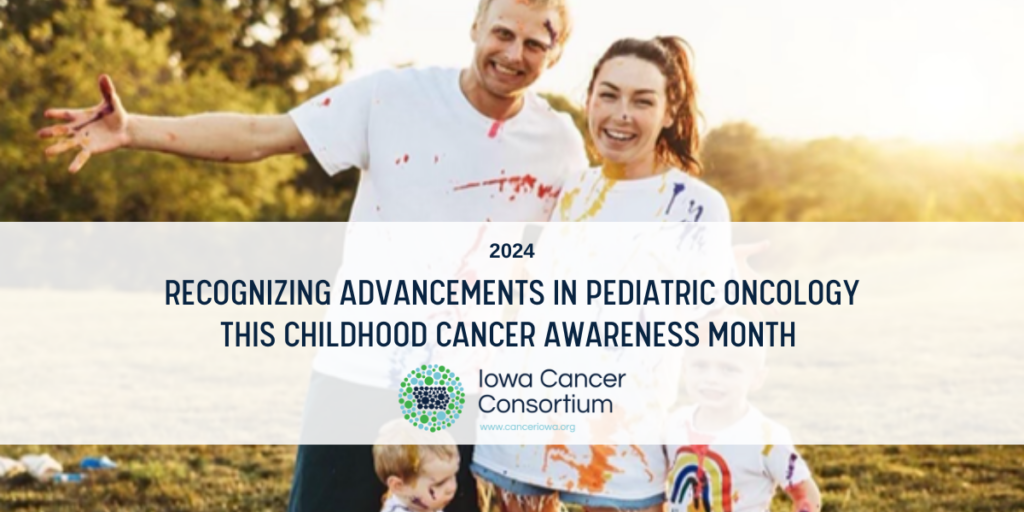Recognizing Advancements in Pediatric Oncology this Childhood Cancer Awareness Month

Written by Natalie Steuer
Gold is a precious metal, and it symbolizes the most precious thing in life—our children. Gold is the official color for all childhood cancers, and September is Childhood Cancer Awareness Month.
Childhood Cancer Awareness Month holds great significance as cancer still remains the leading cause of death by disease for children under the age of 14 (source). Childhood Cancer Awareness Month has a special significance to me because my son Sage was diagnosed with cancer three years ago.

Creating happiness through their storm, Natalie and her family enjoy a paint fight during Sage’s treatment.
Sage was three years old when he was diagnosed with a soft tissue sarcoma called rhabdomyosarcoma (RMS). Even though treatment for RMS hasn’t changed in 20 years, the long-term effects of the treatment Sage received are still mostly unknown. RMS effects skeletal muscles, and while Sage is thankfully doing much better now at age 6, he has mobility issues and has needed further surgery to help increase his mobility. Going through cancer has been the hardest chapter of my family’s story.
And every family’s story of childhood cancer is different. Because childhood cancer is fortunately rare, it makes research difficult with such a small sample size. (Read more about initiatives to unify childhood cancer research and data.) But progress has been made, even if we wish it was faster and for every form of cancer.
Let’s take a journey through the progress made at the state and national level to understand, treat, and prevent childhood cancer.
Did you know that the first uses of chemotherapy to treat cancer were for children with leukemia at Boston’s Children’s Hospital in the 1940’s? By 2000, a historic milestone was achieved with the mapping of the first human genome, allowing for the identification and analysis of every gene in an individual’s DNA. Fast forward to 2017, and the approval of CAR-T therapy for pediatric use was a groundbreaking moment, particularly impactful for blood cancers (just as chemotherapy had been nearly 80 years earlier).
It’s remarkable to note that from 2017-2023, the number of approved drugs for childhood cancer grew more than 5 times the amount approved from 2012-2016 (source). However, it’s disheartening that despite this progress, children wait an average of 6.5 years longer than adults for drug approval following clinical trials.
A significant victory for Iowa was attained in May 2024 with the passing of a historic law mandating state-regulated insurance companies, including Medicaid, to cover biomarker testing for cancer patients of all ages. This expanded access is a step toward addressing disparities in communities’ access to cancer care. Read more about this bill here.
Iowa is fortunate to have two children’s hospitals that possess the ability to treat pediatric hematology and oncology patients, including several rare forms of cancer requiring specialized treatment. Thousands of children have been treated at Blank Children’s Hospital in Des Moines and the University of Iowa Stead Family Children’s Hospital in Iowa City – including Sage.
Amidst all these scientific strides, it’s crucial to remember the families and children affected by childhood cancer. Childhood cancer awareness extends beyond September, as 47 children are diagnosed with cancer every day in the U.S. Three years ago, Sage was one of those children. I hope you’ll remember this month – and every month – to listen to the stories of families and children who’ve experienced childhood cancer. By raising awareness about this set of devastating diseases, we can ensure that more research and advocacy is done to reduce the burden of cancer for future children and families.
 About the Author
About the Author
Natalie Steuer has been a dedicated advocate for childhood cancer ever since her son was diagnosed with an aggressive form of cancer at age 3. He was treated at the University of Iowa Stead Family Children’s Hospital, and the Childhood Cancer Data Initiative was critical in his treatment. He needed genomic testing, which helped determine which chemotherapies would be most effective. Parents and caregivers play a vital role in their child’s cancer treatment, and Natalie encourages everyone to empower themselves with information.
